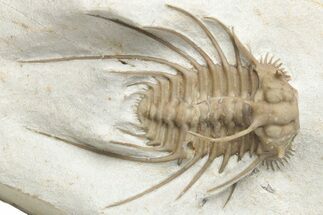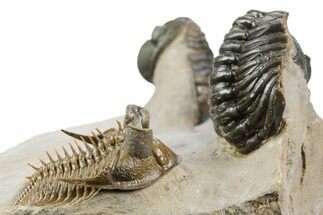This Specimen has been sold.
Three Trilobite (Kainops & Paciphacops) Fossils - Oklahoma
This is a 7 x 3.3" piece of limestone from the Haragan Formation of Oklahoma with three phacopid trilobite fossils. The more outstretched specimen is Kainops raymondi, along with a complete Paciphacops cambelli and a partial Paciphacops. While these two species look very similar, Kainops has larger eyes, and more eye facets than Paciphacops. The piece has been nicely prepared with air abrasives under microscope to expose the detailed fossils.
About Trilobites
Trilobites are an extinct class of marine arthropods that thrived for nearly 270 million years, from the early Cambrian to the end of the Permian period (around 521 to 252 million years ago). They are one of the most successful and diverse groups in the history of life, with over 25,000 described species spanning a wide range of sizes, shapes, and ecological niches. Known for their distinctive, segmented exoskeletons, trilobites provide invaluable insights into the evolutionary history of arthropods and the dynamics of ancient marine ecosystems.
Trilobites are an extinct class of marine arthropods that thrived for nearly 270 million years, from the early Cambrian to the end of the Permian period (around 521 to 252 million years ago). They are one of the most successful and diverse groups in the history of life, with over 25,000 described species spanning a wide range of sizes, shapes, and ecological niches. Known for their distinctive, segmented exoskeletons, trilobites provide invaluable insights into the evolutionary history of arthropods and the dynamics of ancient marine ecosystems.
SPECIES
Kainops raymondi & Paciphacops cambelli
AGE
LOCATION
Black Cat Mountain, Clarita, Oklahoma
FORMATION
Haragan Formation
SIZE
Rock 7 x 3.3"
CATEGORY
SUB CATEGORY
ITEM
#212349
We guarantee the authenticity of all of our specimens.
 Reviews
Reviews



















